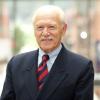Dr. Manuel Carballo is an epidemiologist and is currently the Executive Director of the International Center for Migration and Health (ICMH), and Professor of Clinical Public Health at Columbia University, Mailman School of Public Health in New York.
He previously worked with WHO in various countries. In the 1980s he was responsible for directing for WHO an international collaborative study on breastfeeding and the impact of breastmilk substitutes on the health of infants and mothers; he then he organized the International Code of Marketing of Breast-milk Substitutes that today guides the infant feeding of the paper industry in this field of health. In 1986 he was one of three on the team chosen to establish the WHO Global Program on AIDS (GPA) and remained with PAM until 1992 as Chief of Behavioral Research. At WHO and MAP he was also responsible for helping 18 African countries to create their national AIDS committees and develop their national plans. In 1993 he went to Bosnia as Public Health Advisor for WHO and remained based in Sarajevo until the end of the war in 1995 as responsible for the whole of Bosnia and Herzegovina. Upon his return from Bosnia, he joined the International Center for Migration and Health, a Swiss-based research and training organization, and worked again in Bosnia. He later he went to Albania and Macedonia for the United Nations to assess the health situation of refugees fleeing Kosovo. In 2001 he was appointed Executive Director of the ICMH. In 2002 and 2003 he led two health assessment missions for the United Nations in the occupied Palestinian territories, and later in 2003 he went to Iraq to do the same. In 2004 he led the Tsunami Fund’s mission for relief and reconstruction in the Maldives and Sri Lanka. In 2005 and 2006 he spent stints in Iran and Afghanistan developing emergency preparedness plans for those countries.




